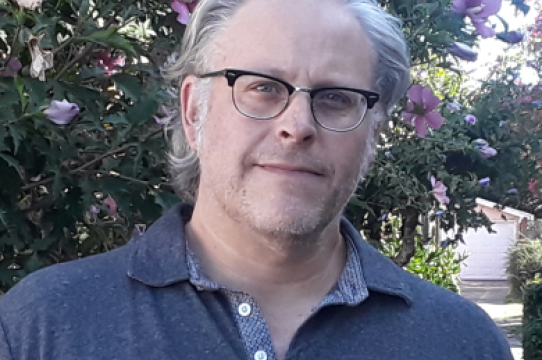When he was just seven years old, Martin Rizzo-Martinez started wondering about colonialism and Indigeneity after learning about grandfather’s heritage.
Rizzo-Martinez grew up in Los Angeles. On a trip to Arizona near where his grandfather grew up near Gallup, New Mexico, Rizzo-Martinez and his family visited a monument with images of Western Apache people. Rizzo-Martinez’s father pointed out that a person in a painting looked a lot like his grandfather.
“My dad explained, ‘Well, we're from New Mexico, and your grandpa has some Indian blood.’ As a little kid hearing about that, it intrigued me. I was trying to understand, wait a minute, is grandpa from here? Does he have Native blood? Later I'd realize, well, that's New Mexico, centuries, centuries of Indigenous and Spanish people.” Rizzo-Martinez said. “At that young age that just made me much more curious about trying to understand colonialism and colonial history, and it just kind of opened up that whole world to me.”
Rizzo-Martinez, a new assistant professor in the film and digital media department at UC Santa Cruz, has been working as a public historian, making audio and video projects where Indigenous perspectives are crucial.
Rizzo-Martinez earned his B.A. in American Studies, as well as an M.A. and Ph.D. in History from UC Santa Cruz. But he started his college career off at UC. Irvine studying philosophy. He loved existentialism, but other classes didn’t hold his interest
Rizzo-Martinez finished that degree, but he decided to try college again — this time with something he felt strongly about. That’s what he found in UC Santa Cruz’s American Studies curriculum and classes dealing with race, ethnicity, and colonialism.
“I kind of reinvented myself as a student. I thought let me try and study the stuff I’m really interested to learn. And I was a great student — I read everything, and I got straight As,” he said. “That’s why when I work with students, I always try to help them find a personal connection. If they can find something that they're passionate about and explore something that they can relate to, I think that it does absolutely change. I've been through that.”
Before going to UC Santa Cruz, Rizzo-Martinez had taken some classes at Cabrillo College, including Native Literature with Stan Rushworth, who introduced him to some Native groups in the area. He wanted to find out what had happened to Indigenous people in the area, and trying to understand that history also led him to UC Santa Cruz.
For the past three years, Rizzo- Martinez had been working as the Historian and Tribal Liaison for the Santa Cruz District with the California State Parks. While on a Zoom call for work, it occurred to him to share these conversations with Native scholars. He and a friend drew on previous radio experience and put together a podcast, Challenging Colonialism. Rizzo-Martinez does the interviews, and his friend, Daniel Stonebloom, handles the technical side.
Rizzo-Martinez’s book, We Are Not Animals: Indigenous Politics of Survival, Rebellion, and Reconstitution in Nineteenth-Century California, which came out in 2022, won the John C. Ewers Award for best new book on North American Indian Ethnohistory.
He is also working on a film, Walk for the Ancestors, about the response of a Native woman and her son to Junipero Serra’s canonization in 2015.
“For many native Californians, that was a really painful moment, and this one woman, Caroline Holland, from the Tatavian tribe down in San Fernando in LA, wanted to do something to honor the ancestors. The initial idea was to walk from her village site to the mission, but then she got inspired to just walk from mission to mission up and down the state, and her son agreed to go with her. The two of them set out for Sonoma, and they ended up walking something like 780 miles from mission to mission. Along the way, they contacted the local tribal communities and held a ceremony at the mission sites..”
A friend connected him to the walk, Rizzo-Martinez says, and he did research on the missions and joined them for some of the walk. At the time, he was working on his dissertation, and he found this helpful.
“The questions that Caroline would send me or call me with, would get me thinking on a broader scale,” he said. “Caroline asked me to help document it and help film it, so we've been interviewing people who are involved and people who came out and supported the walk itself, but also the bigger picture issues. I think it really did connect people up and down the state to a common cause.”
October 2023


